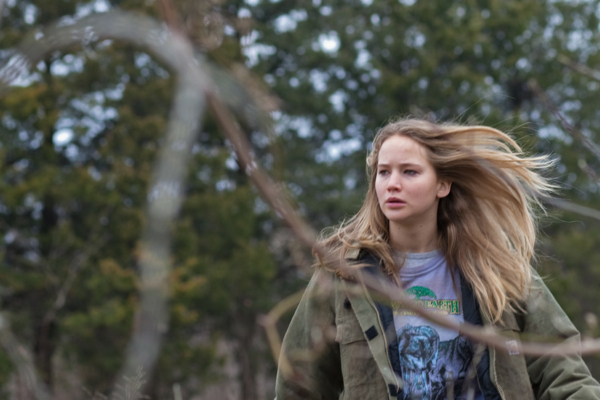Movie review by Greg Carlson
Bleak, laconic and as chilling as its title, “Winter’s Bone” shares a rarely seen snapshot of American poverty and despair in rural Missouri. Based on Daniel Woodrell’s 2006 novel, director Debra Granik’s adaptation exchanges Woodrell’s poetry – which can feel simultaneously sinewy and rawboned – with a more lived-in realism that suggests documentary as much as tragic fable. Following the backwoods Ozark Mountains odyssey of seventeen-year-old Ree Dolly (Jennifer Lawrence), who must quickly locate her missing father Jessup Dolly or lose the family property, “Winter’s Bone” earned top honors at the 2010 Sundance Film Festival, where it was also recognized for its screenplay, written by Granik and Anne Rosellini.
“Winter’s Bone” operates on the surface as a quiet procedural, in which Ree risks her life by assuming a role that makes her part bounty hunter, part detective, and all tenacious daughter. Despite her youth, Ree manages a household consisting of her barely functioning mother and two younger siblings, who entirely depend on their older sister for survival. Neither Granik nor Lawrence sentimentalize the character, whose fierce dedication to her loved ones knots around a generations-spanning code of behavior that governs the actions of clan and kin, especially in the service of settling disputes internally and keeping legal authorities as far away as possible.
“Winter’s Bone” is not a perfect film, and its greatest deficiency is the way it underutilizes the indispensable and magnetic John Hawkes, who plays Ree’s uncle and reluctant ally. In “Me and You and Everyone We Know,” “Deadwood,” and an impressive number of other television and film credits, Hawkes has built a reputation as a phenomenal talent. As Jessup’s brother Haslam, who goes by the nickname Teardrop, Hawkes dances from livewire menace to haunted paranoia to dutiful resignation. He surely doesn’t want to discover his brother’s fate, as that knowledge will demand the kind of retaliation that can only end in his own murder.
One of Granik’s toughest, smartest, and most surprising choices is the almost total elision of scenes in which methamphetamine openly claims the center of the action. Instead, the drug and all of its painful, destructive ravages disperse through the movie’s atmosphere like a menacing cloud of toxicity. Ree turns down several offers to snort crank, but at no time does Granik resort to sensationalized ravings of high abusers that typically come standard in mediated interpretations of films with the illegal drug trade as subject. The audience never sees an active crystal meth lab or anyone engaged in the manufacturing process. As a character named Megan points out when Ree mentions that Jessup is known for his crank cooking, “Honey, they all do now. You don’t even need to say it out loud.”
At one point, Ree meets with a representative of the United States Army, played by non-actor and professional recruiter Russell Schalk, to find out how quickly she might be able to secure the signing bonus that would ease the pressure to make ends meet (and offer Ree the opportunity to escape the black hole of her foreseeable future). In just a few short minutes, Schalk’s character thoughtfully, even tenderly, dismantles Ree’s desperate naivete. One of the film’s most powerful scenes, it serves as a reminder of Ree’s daily hand-to-mouth struggle as well as the extent to which she is rooted to an unsustainable way of life. Along with a scene in which Ree begs her catatonic mother for help, we are only offered these briefest reminders that the film’s heroine is still a teenager.
